News
Covid-19 and Manufacturing Industry Sectors Were Addressed in the Joint Meeting of ICI August Assembly and Profession Committees (MESKOM)
- 26.08.2020
- News
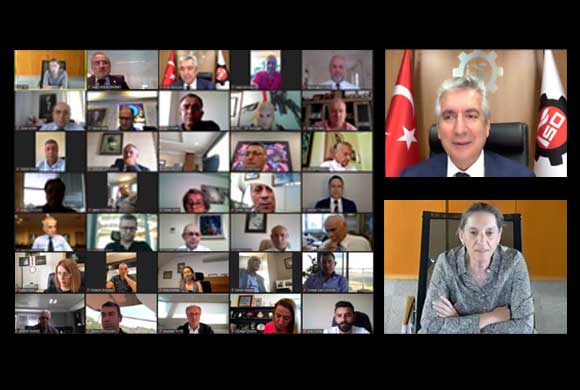
August Assembly of Istanbul Chamber of Industry (ICI) was realized as video conference on 26 August 2020 as a joint meeting of Assembly and Profession Committees (MESKOM). At the meeting chaired by Zeynep Bodur Okyay, ICI Assembly President and with the main agenda of “Evaluation of Covid-19 and Manufacturing Sectors in New Normal - Risks, Opportunities and Road Maps Report”, the overall situation in Covid-19 period and future of the manufacturing industry sectors were evaluated.
At the meeting where the opening meeting was made by Erdal Bahçıvan, ICI Board of Directors President, ICI Assembly and ICI MESKOM members shared their opinions. The guest speaker of August was Haluk Yalçın, PwC Türkiye President. Yalçın shared his opinions regarding the Evaluation of Covid-19 and Manufacturing Sectors in New Normal - Risks, Opportunities and Road Maps Report” prepared by PwC briefly with the industrialists. Hüsnü Dinçsoy, the Leader of PwC Türkiye Consultation Services participated in the meeting and made a brief speech while İdil Özdoğan, the Director of PwC Consultation Services made a detailed presentation regarding the report and answered the questions.
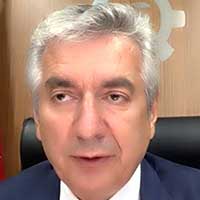
Erdal Bahçıvan ICI Board of
Directors President
Erdal Bahçıvan, ICI Board of Directors President who addressed the agenda at the ICI Assembly mentioned about the global developments firstly and then drew attention that the Coronavirus graphic started to rise in many countries during the recent weeks once again. Stating that the restrictive precautions might be put on the agenda in the world, Bahçıvan said that: “It is obvious that the world has not experienced the medium and long-term impacts of the pandemic yet; even we still cannot foresee some. There are potential obstacles before the sustainability of the recovery observed in the global economy table since the middle of the year.”
Drawing attention to the positive direction in many indicators in Türkiye especially Turkish Manufacturing PMI Export Climate Index announced by ICI, Bahçıvan stated that: “We are going through a period when we need to attach importance and care to the sustainability, quality and financial stability which is one of its keystones as much as we do for the speed of the growth.”

Zeynep Bodur Okyay
ICI Assembly President
The August Assembly meeting was opened by Zeynep Bodur Okyay, the ICI Assembly President. When opening the meeting, Okyay said that:
“The new normal that we entered upon the global epidemic imposes on us to be one of the countries selling the technology, not buying it in the future. The future of our companies and the manufacturing economy we are dreaming of depends on the speed and quality of this transformation. The global crisis simulations carried out put forward that many industries have the potential to lose 40% of their profits once in ten years on average in the shocking periods experienced. We are face to face with a new challenge upon the pandemic.
Projections focusing on the tension among USA, China and EU point out that nearly 15-25 percent of the global commercial flow might shift to different regions in the next five years. In other words, we are talking about an axial shift in trade ranging from $2.9 trillion to $4.6 trillion. Two basic factors will have an impact on taking such decisions: Financial reasons such as the cost of moving the production to another location, and political reasons such as deciding on the locally manufacture of the critical products.
Of course, such data does not mean that the supply chain will be structured from scratch. Because an economical logic lies behind the current shape of the industrial supply chains. When the scale, complicated and interlinked structures of this network is taken into consideration, it is very difficult to restructure the value chains. In such an environment, it is of crucial importance for Türkiye that is intended to realize a strong breakthrough in any field varying from industry to logistics to prepare itself in a way to have a leading role in this transformation. Investing infrastructure, labor and international trade, and realizing the appropriate application to the changing international trade dynamics will strengthen Türkiye's economy. "
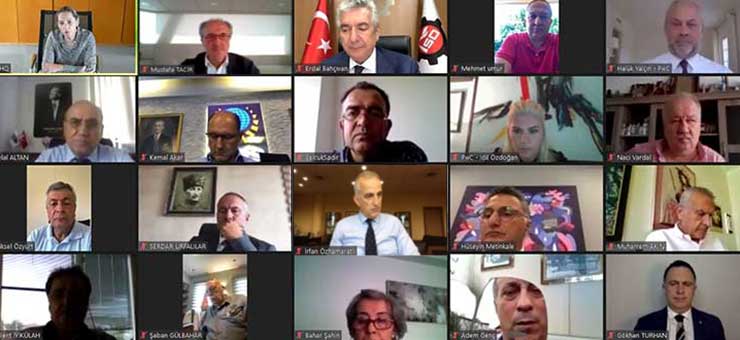
Okyay, the ICI Assembly President left the floor to Erdal Bahçıvan, ICI Board of Directors President to make his speech. In his speech on the impacts of ongoing epidemic coronavirus on Turkish economy since March, Bahçıvan, ICI President drew attention that some data announced during the recent weeks gave hope that the economy has overcome the Coronavirus shock, but on the other hand, the sustainable growth and financial stability should be attached great care. Bahçıvan continued:
The industry manufacturing index purified from the calender and seasonal impacts which shrank by 35 percent cumulatively in the first two months of the pandemic recorded a growth by 17,6 during June following the recovery for 18 percent in May. Leading indicators of July show that the recovery in operating conditions has become evident:
ICI Türkiye Manufacturing PMI has reached to the highest level of the last 9,5 years by 56,9 and pointed out to a strong beginning for the second half of the year. ICI Türkiye Export Climate Index measuring the export conditions of our industrialists increased to 53 and exceeded the threshold of 50 for the first time in the last 5 months. When the demand conditions are taken into consideration which is the prerequisite of the growth, it is seen that the postponed consumption expenses gained a strong speed especially automotive and residence expenses.
The role of precautions to encourage banks to extend loans and favorable interest rates is unquestionably great in this development. In parallel to the relative improvement experienced, there is a recovery in the financial trust indexes. However, such strong indicators do not mean that we have overcome all the problems that our economy has been going through. “We are going through a period when we need to attach importance and care to the sustainability, quality and financial stability which is one of its keystones as much as we do for the speed of the growth.”
Mentioning about the extent of the damage caused by the pandemic on the global economy, Bahçıvan recorded that Coronovirus will be the reality of our life for a while and high risk and uncertainty environment in the economy will spread over a long period of time. Stating that when looking at the second quarter’s Gross Domestic Product data in the world, they witnessed that the Euro Zone shrank by 12 percent, Britain by 20 percent, Japan by 28 percent, and the USA by 33 percent, Bahçıvan said that: On the other hand, normalization signs are observed in the third quarter upon loosing the restrictions imposed against the pandemic in the whole world since May and especially June. Global PMI indexes pointed out that global manufacturing industry and service industry could readjust to the growth tendency slowly after the six-month shrinking period.
When we look at the latest developments in the fight against the global economic crisis born by Covid-19, it is understood that major-scaled central banks which have been involved in the process through their resources since the beginning of the crisis will continue to maintain their supportive monetary policy stance for a longer period of time. Despite of being criticized for some of its deficiencies, the agreement with the European Union on the rescue package in the amount of 750 billion Euro and the seven-year budget in last month was an important development in terms of alleviating the insecurity. It is a significant question mark whether an agreement on an additional support package similar to that of Congress will be realized in USA where the presidency elections are coming and any deceleration has not been observed in the speed of the pandemic.
Stating that the Coronovirus graphic started to rise in many countries during the recent weeks, Bahçıvan shared his opinions:
“The news that restrictive measures are taken once again because of the acceleration in the speed of spread of the virus in some countries reinforces the pessimism for the winter months. Even if such risks and concerns do not come true, it is obvious that the world has not experienced the medium and long-term impacts of the pandemic yet; even we still cannot foresee some. There are potential obstacles before the sustainability of the recovery observed in the global economy table since the middle of the year.
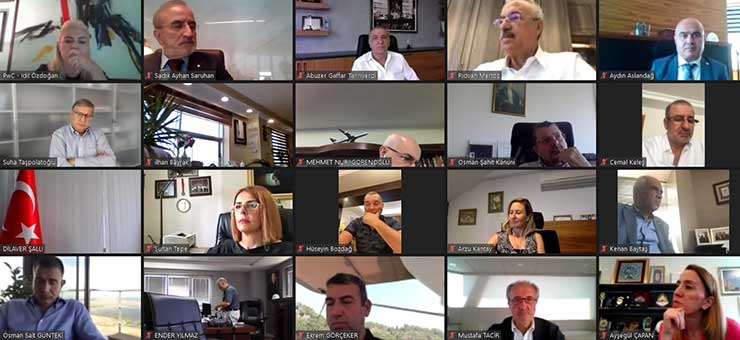
For example, because of the “extra loose” monetary and financial policies applied to recover the financial damage caused by the Coronavirus, serious risks might be observed in the budge balances, price stability and financial stability in the following period. As the impacts of the pandemic maintain their existence, the need for large-scale money injections of central banks and high budget deficits of governments continues, and the extent of the consolidation to be implemented after the pandemic is also growing.
Furthermore, geopolitical, commercial and strategic tensions, which were quite hot during the pre-pandemic period continue to increase in the new period. Initiatives to reduce dependence on China in supply chains, the upcoming USA elections, increasing social unrest in some countries, rising tension in the Mediterranean, and Eastern Europe that has been warmed upon the developments in Belarus, new positions in the Middle East after the explosion in Beirut and many other factors cause the future to be more uncertain.”
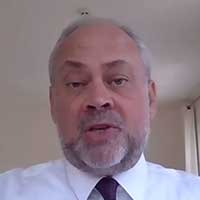
Haluk Yalçın PwC Türkiye President
Making a short speech on the image of manufacturing sector in Türkiye and the world at the meeting, Haluk Yalçın, the PwC Türkiye President said that: “Our studies and works include smart solutions and smart start-ups covering the issues to be considered by the sectors and which products are coming to the forefront in the following period.” Yalçın briefly stated that:
“In world trade, interests must be optimally combined instead of making discriminations as friend and enemy. A different mosaic will be formed in the world trade. Pandemic accelerated this formation; but it was already going to happen. Türkiye had a chance to replace the Chinese products or substitute China in the pandemic period but the sectoral transformations should be completed first.
We are entering into a different competition period. It should be taken into consideration that working style and labor force have changed. We should set a vision to occur in the joint brain storms in the sectoral assemblies. Türkiye does not have the chance to jump into each opportunity in the following 10 years. When the limited resources are taken into consideration, we will go through this 10 years by taking smart steps. We should name our domestic and national production strategy correctly. We should use the option of taking part in the investments that might increase our smart share in the world trade and expand our profit margin. The picture of the world will radically change within 10 years.
The pandemic accelerated this transformation but has not given its the final shape. We will throw a stone to a moving train. It is of crucial importance for the industrial to address this topic since the rule makers do not feel the transformation process fully. We have a limited maneuver area in a structure where the employment with 83 million of population with limited resources are of that much importance. Even though the investment arena in Türkiye is not stable at all, there are foreign firms investing in Türkiye for more than 100 years. We should transform the consolidation of SMEs into smart investments, smart companies and smart consolidation with joint investments. "
Hüsnü Dinçsoy, the Consultation Services Leader who participated in the meeting as well made a brief speech regarding the report. Dinçsoy continued:
"This study is a study to discuss the impacts of Covid-19 on the name of Turkish industry for the first time. We are exposed to a info-dumb regarding Covid-19 but they are generally the translated versions of the foreign studies conducted beforehand. But, we conducted a research only based on Turkish industry. This is why it is of importance. The study was completed in seven weeks by a large team and covers 55 sectors. Namely, it is a detailed and strong study. What should be done from now on is that President of each sector should study in a more detailed way, thus the results that can take us to one step ahead can be obtained.”
İdil Özdoğan, the PwC Türkiye Consultation Services Director made a detailed presentation regarding the “Evaluation of Covid-19 and Manufacturing Sectors in New Normal - Risks, Opportunities and Road Maps Report”. Özdoğan briefly stated that:
“Within the manufacturing pattern of Türkiye, both SMEs and major-scaled companies are included. Well, should they have same export strategies or each company in Türkiye be exporter? Companies in China is state companies and a strategy is being prepared for them to proceed through the same and one route. SMEs can carry out production in a consolidated way. Creating economies of scale for minor-scaled companies is on our agenda as well but the company's intention is essential in this regard. Companies should be close to joint production. The e-commerce platform is more suitable for SMEs. We need to talk about alternative channel and alternative export platforms. Even though not everyone is an exporter, but we can establish platforms to support the main exporters.
Following the speeches and presentations, ICI Assembly and Profession Committee Members shared their opinions regarding the agenda and asked their questions to the PwC directors regarding the report and thus provided with detailed information about their sectors.